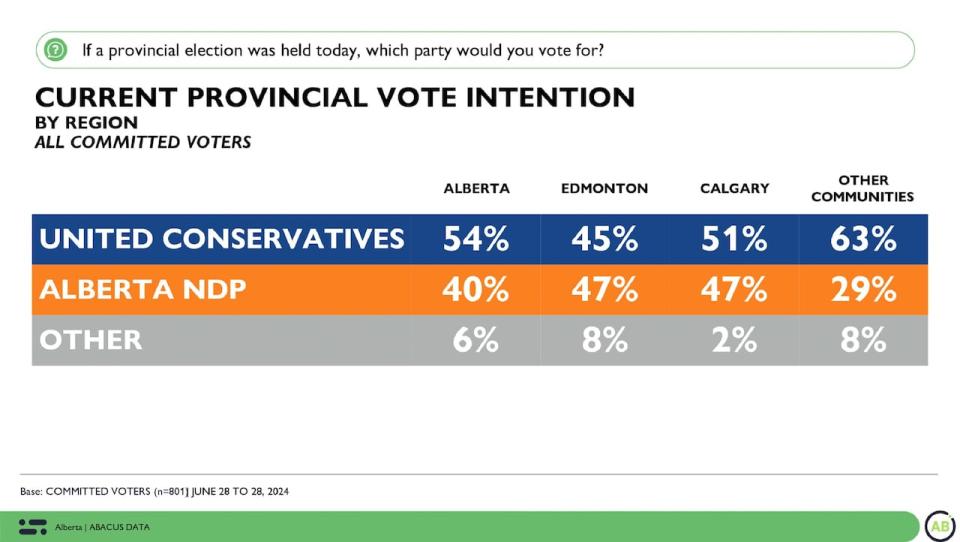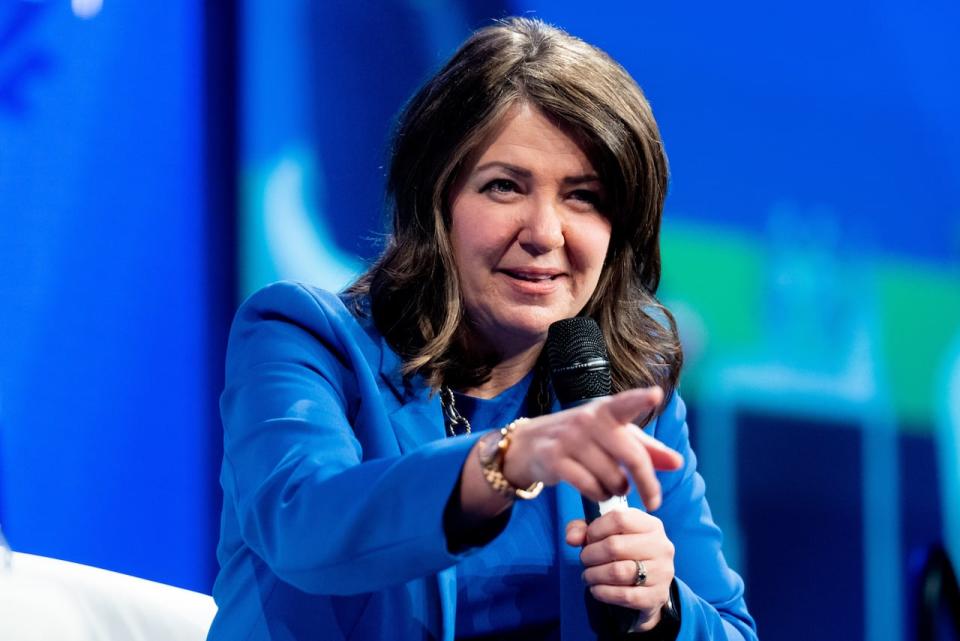Naheed Nenshi's Alberta NDP still trailing governing UCP by 14 points in new survey
Naheed Nenshi's recent landslide NDP leadership win doesn't appear to have translated into a major shift in public opinion in Alberta as new polling suggests the governing United Conservative Party is holding a steady 14-point lead.
The Abacus Data survey of 1,000 Albertans aged 18 and over, conducted days after Nenshi's leadership win on June 22, found results consistent with the last survey the polling firm released in March.
If the election were held today, 54 per cent of committed voters would choose the UCP while 40 per cent would vote for Alberta's New Democrats, the poll suggests. Six per cent would choose another party.
Compared to March, the UCP is down one point and the NDP's support has not moved.
"Despite Nenshi's landslide victory … he finds himself still well behind, and clearly lots of work to do if he hopes to be the premier in over three years when the next election comes around," said pollster David Coletto.
Around half of accessible NDP voters support split
While the UCP remains in the driver's seat, the poll suggests notable support for one move that could change the public's perception of Nenshi's party: a split of the provincial NDP from the federal party.
"The biggest hurdle for the Alberta NDP is the fact that there's large numbers of Albertans in many parts of the province who wouldn't even consider voting NDP," Coletto said.
"If you want to send a signal that the Alberta version of this party is different from its federal counterpart, that might be a first step."
Shortly after winning the leadership, Nenshi said party members could make a decision on a possible split at a party convention next spring.
When asked about the possible divorce, 49 per cent of Albertans said they supported it, compared to 21 per cent who opposed it.
That included 51 per cent of accessible Alberta NDP voters, referring to those Albertans who are open to voting for the party. Forty-nine per cent of Alberta NDP supporters and 43 per cent of federal NDP supporters also said they supported such a move.
"Whether [NDP] members feel the same way, I don't know. But certainly there's broad, broad support for it," Coletto said.
During the leadership campaign, Nenshi made reference to conversations he has had with voters who indicated their trepidation in supporting the provincial NDP given its ties to the federal party.
"That party has been pretty decisively opposed to the energy industry, broadly speaking," said political analyst Lori Williams of Mount Royal University.
"A lot of people don't want to join the provincial NDP if that means also joining the federal NDP and appearing to support policies that they disagree with."
NDP influence in Calgary rises as Edmonton fades
The poll also suggested the new-look Alberta New Democrats are being received differently in Calgary and Edmonton.
Since Nenshi's victory, the NDP has closed an eight-point Calgary gap in the March survey to four points.
But in Edmonton, long an NDP stronghold, the party's lead has deflated from 11 points to two points over the UCP, the poll suggests.
The UCP is overwhelmingly ahead outside Calgary and Edmonton with a 34-point lead.
"Mr. Nenshi has work to do in the province outside of Calgary," Coletto said.
"In particular, I think he's got to spend some more time getting people in Edmonton comfortable with him and getting to know him a little bit better."

Despite the challenges, the poll still highlights that the new NDP leader could be a threat to the UCP, according to Coletto.
Nenshi may be well-known in some circles, but the poll suggests many Albertans still aren't especially familiar with him. In Calgary, 73 per cent of respondents said they know Nenshi at least pretty well, compared to 44 per cent in the rest of the province.
"People who know Naheed Nenshi like him. As he introduces himself to more Albertans, there's a real threat there for [UCP Leader and Premier] Danielle Smith," Coletto said.
"We know he's smart. We know he knows how to win elections. Those are all things that point to him being a real threat. And the fact that the UCP is already out there advertising against him, I think, is a signal they know that, too."

For Smith, the poll brings good news in the form of approval numbers. Forty-two per cent of respondents said they approve of the provincial government's job performance, which is up 10 points since March. Thirty-nine per cent said they disapprove.
"You've got to feel pretty good about that. There's not many incumbents anywhere in the democratic world — facing the kind of environment where you've got cost of living, housing and health concerns, top of the list — who can say that," Coletto said.
"This is still a province that, if an election were today, would likely re-elect Ms. Smith and her party. All the underlying numbers, beyond even the horse race, signal that she's in a good position right now."
The Abacus Data survey of 1,000 Albertans aged 18 and over was conducted June 25 to 28. The random sample of panelists were invited to complete the survey from a set of partner panels based on the Lucid exchange platform. Abacus said partners are typically double opt-in survey panels, which are blended to manage out potential skews in the data from a single source. The margin of error for a comparable probability-based random sample of the same size is +/- 3.31 percentage points, 19 times out of 20.
Abacus said the data was weighted according to census data to ensure the sample matched Canada's population according to age, gender, educational attainment and region.

 Yahoo News
Yahoo News 
